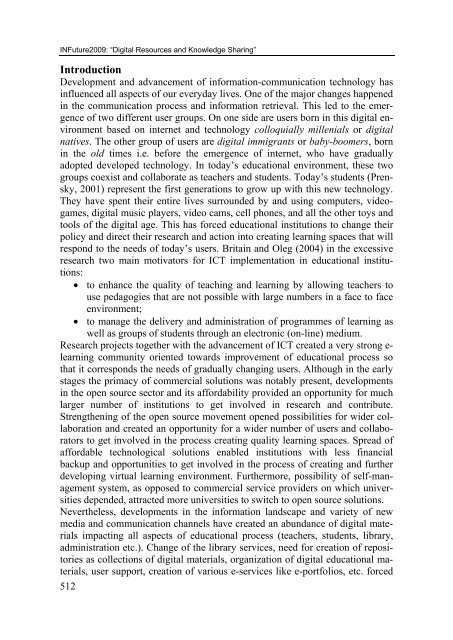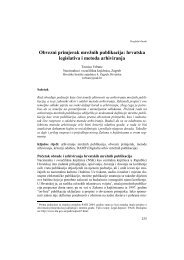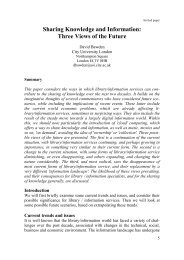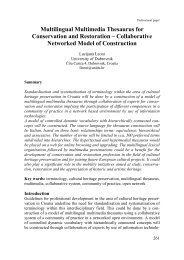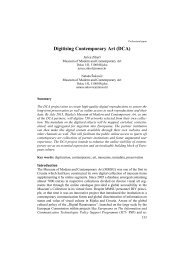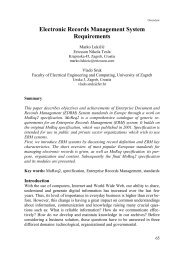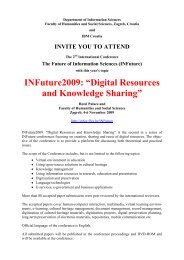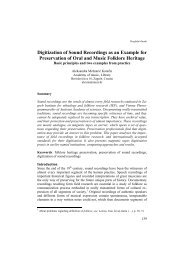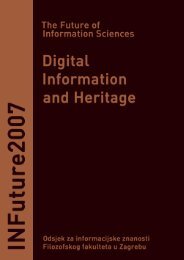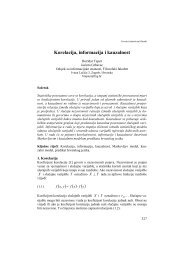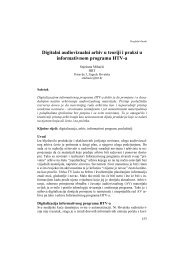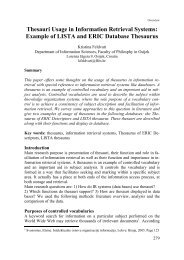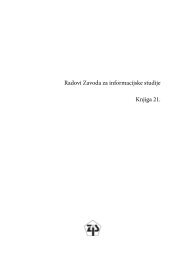Virtual Learning Spaces: Example of International Collaboration
Virtual Learning Spaces: Example of International Collaboration
Virtual Learning Spaces: Example of International Collaboration
You also want an ePaper? Increase the reach of your titles
YUMPU automatically turns print PDFs into web optimized ePapers that Google loves.
INFuture2009: “Digital Resources and Knowledge Sharing”<br />
Introduction<br />
Development and advancement <strong>of</strong> information-communication technology has<br />
influenced all aspects <strong>of</strong> our everyday lives. One <strong>of</strong> the major changes happened<br />
in the communication process and information retrieval. This led to the emergence<br />
<strong>of</strong> two different user groups. On one side are users born in this digital environment<br />
based on internet and technology colloquially millenials or digital<br />
natives. The other group <strong>of</strong> users are digital immigrants or baby-boomers, born<br />
in the old times i.e. before the emergence <strong>of</strong> internet, who have gradually<br />
adopted developed technology. In today’s educational environment, these two<br />
groups coexist and collaborate as teachers and students. Today’s students (Prensky,<br />
2001) represent the first generations to grow up with this new technology.<br />
They have spent their entire lives surrounded by and using computers, videogames,<br />
digital music players, video cams, cell phones, and all the other toys and<br />
tools <strong>of</strong> the digital age. This has forced educational institutions to change their<br />
policy and direct their research and action into creating learning spaces that will<br />
respond to the needs <strong>of</strong> today’s users. Britain and Oleg (2004) in the excessive<br />
research two main motivators for ICT implementation in educational institutions:<br />
• to enhance the quality <strong>of</strong> teaching and learning by allowing teachers to<br />
use pedagogies that are not possible with large numbers in a face to face<br />
environment;<br />
• to manage the delivery and administration <strong>of</strong> programmes <strong>of</strong> learning as<br />
well as groups <strong>of</strong> students through an electronic (on-line) medium.<br />
Research projects together with the advancement <strong>of</strong> ICT created a very strong elearning<br />
community oriented towards improvement <strong>of</strong> educational process so<br />
that it corresponds the needs <strong>of</strong> gradually changing users. Although in the early<br />
stages the primacy <strong>of</strong> commercial solutions was notably present, developments<br />
in the open source sector and its affordability provided an opportunity for much<br />
larger number <strong>of</strong> institutions to get involved in research and contribute.<br />
Strengthening <strong>of</strong> the open source movement opened possibilities for wider collaboration<br />
and created an opportunity for a wider number <strong>of</strong> users and collaborators<br />
to get involved in the process creating quality learning spaces. Spread <strong>of</strong><br />
affordable technological solutions enabled institutions with less financial<br />
backup and opportunities to get involved in the process <strong>of</strong> creating and further<br />
developing virtual learning environment. Furthermore, possibility <strong>of</strong> self-management<br />
system, as opposed to commercial service providers on which universities<br />
depended, attracted more universities to switch to open source solutions.<br />
Nevertheless, developments in the information landscape and variety <strong>of</strong> new<br />
media and communication channels have created an abundance <strong>of</strong> digital materials<br />
impacting all aspects <strong>of</strong> educational process (teachers, students, library,<br />
administration etc.). Change <strong>of</strong> the library services, need for creation <strong>of</strong> repositories<br />
as collections <strong>of</strong> digital materials, organization <strong>of</strong> digital educational materials,<br />
user support, creation <strong>of</strong> various e-services like e-portfolios, etc. forced<br />
512


